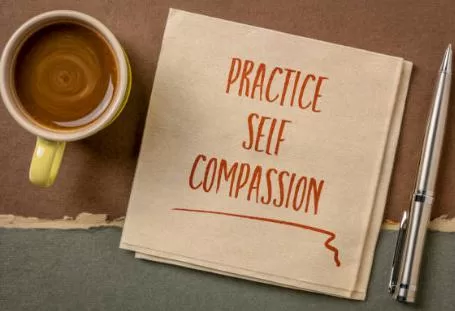How Can I Use Self-Love To Overcome Self-Doubt And Insecurity?
Learn how to use self-love to overcome self-doubt and insecurity.

Selfpause Affirmation App
Download the app to get 1,000’s of affirmation meditations and everything you need to write, record and listen to your own.
Self-doubt and insecurity are typical emotions that impact a large number of individuals. These emotions can develop in numerous contexts, including the workplace, social interactions, and personal relationships. Self-doubt and insecurity are normal, but when they become excessive, they can have detrimental effects on our mental health, relationships, and overall well-being. The practice of self-love is one technique to fight these negative emotions. This essay will discuss how self-love might assist in overcoming self-doubt and insecurity.
What exactly is self-love?

Self-love is the practice of caring for and treating oneself with kindness, respect, and compassion. It involves accepting yourself as you are, appreciating your skills and shortcomings, and recognizing your worth. Engaging in activities that support your physical, emotional, and mental well constitutes self-love. Self-love is not an act of selfishness, but a vital practice that facilitates the development of good relationships with oneself and others.
How does self-love aid in the defeat of self-doubt and insecurity?
Self-love is a potent instrument for overcoming self-doubt and insecurity. Here are some advantages of self-love:
It enhances confidence.

Self-love aids in the development of self-confidence by allowing you to concentrate on your strengths and successes rather than your weaknesses and failings. When you love and accept yourself, you are less likely to compare yourself to others and to experience feelings of inadequacy. As a result, your confidence and self-esteem will increase.
It encourages self-consciousness

Self-love fosters self-awareness by increasing connection to one’s emotions and needs. Self-love is taking the time to listen to your inner voice and choose your values and priorities. This knowledge enables you to establish limits, make decisions consistent with your principles, and successfully convey your requirements. By understanding your feelings and needs, you are less likely to have self-doubt and more likely to make decisions that promote your wellbeing.
It promotes self-care

Self-love promotes self-care, a key component of well-being. Self-care is prioritizing your physical, emotional, and mental wellness. You engage in activities that nourish your body, mind, and spirit, such as exercising, meditating, spending time with loved ones, or pursuing a hobby. You may battle negative self-talk and build a positive self-image by showing yourself love and kindness by taking care of yourself.
It fosters self-compassion.

Self-compassion is the act of treating oneself with kindness, empathy, and understanding. When you practice self-compassion, you recognize that everyone endures suffering, failure, and inadequacy. You show yourself the same kindness and empathy you would a loved one. This technique can assist you in overcoming self-doubt and insecurity by fostering self-acceptance and decreasing self-criticism.
How can one demonstrate self-love?
Self-love is a practice that requires time and commitment. Here are some daily practices for cultivating self-love:
Practice self-care

Self-care is a crucial component of self-love. It entails engaging in activities that improve your physical, mental, and emotional health. The following are examples of self-care activities:
Exercising releases endorphins, which can improve mood and alleviate stress.
Meditation on mindfulness can help you reduce stress and enhance self-awareness.
Spending time with family and friends might help you feel connected and supported.
Artistic pursuits, such as drawing or playing an instrument, can help you express yourself and relieve stress.
Challenging negative self-talk

Self-esteem and wellbeing can be negatively affected by negative self-talk. When you recognize yourself participating in negative self-talk, dispute its veracity. Consider whether your negative thoughts are founded on facts or assumptions. Substitute negative ideas with affirmations such as “I am worthy,” “I am sufficient,” and “I am capable.”
Set constraints

Establishing limits is a crucial component of self-love. Communicating your needs and limits to others and placing your well-being first is setting boundaries. Clearly define your limits and communicate them to others. Say no to activities and demands that contradict your principles and priorities.
Employ self-compassion

Self-compassion is treating yourself with care and compassion. Cultivate self-compassion by accepting your faults and flaws without judging or criticizing yourself. Apply the same compassion and understanding to yourself that you would to a loved one.
Honor your strengths and achievements.

Appreciate your abilities and achievements, regardless of how tiny they may appear. Reflect upon your accomplishments and acknowledge your growth. Celebrate yourself by engaging in anything that brings you joy, such as indulging in a favorite meal or activity.
Surround yourself with happiness.

Create a positive environment through building relationships with supportive and encouraging individuals. Minimize your exposure to negativity, including bad news and negative individuals. Surround yourself with positive affirmations, such as motivational phrases or affirmations that serve as a reminder of your worth and importance.
Self-love is a potent instrument that can aid in overcoming self-doubt and insecurity. By practicing self-love, you can cultivate self-confidence, self-awareness, self-care, and self-compassion. To nurture self-love, engage in self-care, confront negative self-talk, establish boundaries, engage in self-compassion, appreciate your strengths and achievements, and surround yourself with positivity. Remember that self-love is a journey that involves effort and perseverance, not a destination. You may nurture self-love and overcome self-doubt and insecurity with time and effort.
